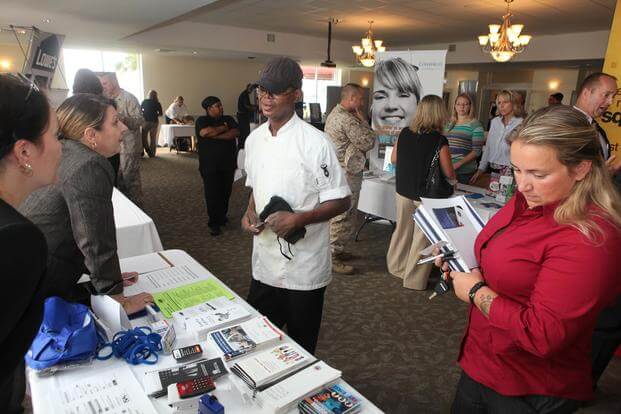Americans overwhelmingly support and respect veterans, but employers and managers can often typecast them as unfeeling and emotionally less suited for jobs requiring them to interact with the public, according to a research study.
The study, published by Duke University's Fuqua School of Business, found that veterans seeking jobs in the restaurant business can be relegated to kitchen help rather than positions out front with customers because of management's perceptions of how they will perform.
The study's approach to how veterans are perceived when applying for jobs began with "theories from psychology that we typically work with -- how that might apply to military veterans," said Dr. Steven Shepherd, a marketing professor at Oklahoma State University and one of three authors of the report.
"We started thinking about the stereotypes people might have about veterans, particularly people who aren't familiar with the military, and how it works," Shepherd said in a phone interview last week.
Related: New Transition Assistance Program Requirements Are Now in Effect
He said that those with no military experience "tend to base their ideas about the military on TV and movies and things like that, which isn't necessarily accurate."
For decades, veterans service organizations have pushed back against the stereotype of the veteran as a brooding and short-tempered loner, but the report found that stereotyping can persist.
"So we ran several studies to try to provide evidence for this idea that, while military veterans are seen quite positively by most people, it can come with some downsides," Shepherd said.
"People see them as being very 'agentic,'" meaning that "they're seen as doers, people who can sort of take action and get things done, but the consequences of that is people see them as sort of less feeling, having less emotion," he said.
"And so that ends up disadvantaging veterans when it comes to applying for jobs that require emotion in some ways," Shepherd added. "... That can mean jobs that require tapping into and expressing emotion, it can mean jobs that require understanding others, empathizing with others, because that requires emotional understanding as well."
The release on the study from Duke University's Fuqua School of Business said that, although veterans are "almost universally heralded as heroes, U.S. military veterans entering the civilian workforce may encounter a downside to the positive reputation they earn for their service."
The research, consisting of 10 studies and randomized experiments with almost 3,000 participants, found that "members of the public, other workers and even experienced managers showed a tendency to relegate veteran job candidates to roles where they would be working with things rather than people," the release states.
"This bias was occurring among actual managers who are in the business of hiring people," said Dr. Aaron Kay, a Fuqua management professor and one of the study's authors. "In one of the studies, we tested this in a large [unnamed] American restaurant chain.
"As these managers were evaluating applicants' resumes, their choices showed they thought veterans were more suited to the kitchen as opposed to jobs where they would be dealing with people," Kay said. "Importantly, veterans were not liked less -- managers just thought the kitchen is where they would thrive."
To counter the biases, Kay and Shepherd said that veterans should consider editing their resumes, possibly by including references to volunteer work with such organizations as a humane society to get across the message that they are feeling and caring individuals.
According to the study, "Merely signaling one's ability to feel can reduce people's biases regarding veterans' abilities and skills."
"We have seen companies make efforts to hire more veterans, but their efforts often fall short when it comes to recruiting them and placing them in the right roles," Kay said. "And it may be because no one has really ever tried, from a basic theoretical perspective, to understand others' perceptions of veterans."
Kay and Shepherd collaborated on the study with psychologist Kurt Gray of the University of North Carolina at Chapel Hill. The research was funded by a Microsoft Military Affairs research gift.
-- Richard Sisk can be reached at Richard.Sisk@Military.com.
Read more: Say Goodbye to the Hated Army UCP Uniform













